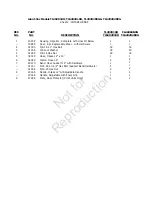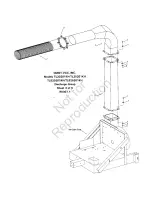
2
safety rules regarding outdoor power equipment (cont.)
SLOPE OPERATION
Slopes are a major factor related to loss-of-control
and tip-over accidents, which can result in severe
injury or death. All slopes require extra caution. If
you cannot back up the slope, or if you feel uneasy
on it, do not operate on it.
Do
• Remove obstacles such as rocks, tree limbs, etc.
• Watch for holes, ruts, or bumps. Uneven terrain
could overturn the unit. Tall grass can hide
obstacles.
• Use slow speed.
• Keep all movement on the slopes slow and
gradual. Do not make sudden changes in speed or
direction.
Do Not
• Do not start or stop on a slope. If tires lose
traction, stop the unit and proceed slowly straight
down the slope.
• Do not turn on slopes unless necessary, and then,
turn slowly and gradually downhill, if possible.
• Do not operate near drop-offs, ditches, or
embankments. The operator could lose footing or
balance or unit could suddenly turn over if a wheel
is over the edge of a cliff or ditch, or if an edge
caves in.
CHILDREN
Tragic accidents can occur if the operator is not
alert to the presence of children. Children are often
attracted to the unit and its activity. Never assume
that children will remain where you last saw them.
• Keep children out of the operating area and under
the watchful care of another responsible adult.
• Be alert and turn unit off if children enter the area.
• Before and during reverse operation, look behind
and down for small children.
• Never carry children. They may fall off and be
seriously injured or interfere with safe unit
operation.
• Never allow children to operate the unit.
• Use extra care when approaching blind corners,
shrubs, trees, or other objects that may obscure
vision.
EMISSIONS
• Engine exhaust from this product contains
chemicals known, in certain quantities, to cause
cancer, birth defects, or other reproductive harm.
• Look for the relevant Emissions Durability Period
and Air Index information on the engine emissions
label.
MAINTENANCE AND STORAGE
• Always observe safe refueling and fuel handling
practices when refueling the unit after
transportation or storage.
• Always follow the engine manual instructions for
storage preparations before storing the unit for both
short and long term periods.
• Always follow the engine manual instructions for
proper start-up procedures when returning the unit
to service.
• Never store the machine or fuel container inside
where there is an open flame, such as in a water
heater. Allow unit to cool before storing.
• Shut off fuel while storing or transporting. Do not
store fuel near flames or drain indoors.
• Keep all hardware, especially impeller bolt, tight
and keep all parts in good working condition.
Replace all worn or damaged decals.
• Never tamper with safety devices. Check their
proper operation regularly.
• Clean debris from units, drives, mufflers, and
engine to prevent fires. Clean up oil or fuel spillage.
• Stop and inspect the equipment if you strike an
object. Repair, if necessary, before restarting.
• Never make adjustments or repairs with the
engine running unless specified otherwise.
• Park machine on level ground. Never allow
untrained personnel to service machine.
• Use jack stands to support components when
required.
• Carefully release pressure from components with
stored energy. (e.g. springs)
• Check impeller on a regular basis for bent, worn
or cracked blades. Only replace impellers; never
straighten or weld them.
• Keep hands and feet away from moving parts.
Not
for
Reproduction





































